|
|
|||||||||||
|
|
|||||||||||
 |
|||||||||||
|
|
|||||||||||
|
![]()
|
Classical Texts on Xingyiquan - excerpts from "Five Elements Essentials of Yue's Intention Boxing" Originally written by Li Cunyi, revised by Dong Xiusheng |
| Translated from Chinese by Jarek Szymanski © J.Szymanski 1999-2002 |
|
|
| The reprint of Dong Xiusheng's book "Five Elements Essentials of Yue's Intention Boxing" is available through this site - click here! |
(1847-1921), also known as Sutang or later as Zhongyuan, was born in Hebei province Shen county Xiaoyingcun village. Coming from a poor family, he worked as a cart driver and practiced long and short range boxing in free time. In one of his travells he was lucky to meet Liu Qilan, from whom he studied both Xingyiquan and Shaolin boxing and weapons. Later Li also learnt Xingyiquan from Guo Yunshen and Baguazhang from his friend and Dong Haichuan's disciple, Cheng Tinghua. Later Li set up a caravan escorting bureau in Baoding called "Wan Tong" and started to accept students. In 26th year of emperor Guangxu (1900) he led his students to take part in Yihetuan (Boxers) uprising against eight allied armies in Tianjin area. Since Li became famous for killing many enemies using a broadsword, later he was often called "Single Broadsword Li" (Dandao Li) for his exquisite broadsword fighting skills. In his late years Li Cunyi gave up caravan escorting business and focused on teaching martial arts. His most famous disciples were Shang Yunxiang, Chu Guiting, Li Jianqiu, Huang Bonian, Li Bintang (son) as well as Li Caiting, one of three famous martial artists from Dingxing (town in Hebei province) called "Three Heroes from Dingxing" (Dingxing San Jie). In the third year of emperor Xuantong (1911) Li Cunyi, together with Ye Yunbiao, Zhang Zhankui, Ma Fengtu and others, established Chinese Warriors Society (Zhonghua Wushi Hui) and became its vice-president and head of coach department. |
|
|
|
In September 1918 Li Cunyi together with Zhang Zhankui went to
Beijing with disciples (Li Jianqiu, Han Muxia and others) to take part in "Ten
Thousand Countries Martial Arts Great Competition", where Han Muxia defeated famous
Russian strong man, Kang'tai'er (in Chinese). Later Li moved to Shanghai where he taught
at Jingwu Sports Association and Nanyang Public School. He wrote several books:
"Martial Arts Manual", "The Essence of Southern and Northern Boxing",
"True Selection of Xingyiquan", etc.
(1882-1939), also known as Dong Jun, was born in Taigu, Shanxi province. From childhood Dong learnt martial arts and medicine from his father, and also took up literary studies. In 1901 Dong started Five Elements Soft Method of Shaolin (Shaolin Wuxing Roushu) studies from Li Shiying and Xingyiquan from Geng Jishan (student of Liu Qilan and Li Cunyi's gongfu brother). In 1914 Dong went to Tianjin to study Xingyiquan from Li Cunyi. In 1918 Dong Xiusheng returned to Shanxi and settled down in Taiyuan where he worked as Traditional Chinese Medicine (TCM) doctor and TCM department director at Shanxi Hospital. Later he became martial arts instructor at Shanxi Minzhong Education Academy and Shanxi Martial Arts Promoting Association. Dong Xiusheng also studied Xingyiquan from Song Huchen (Song Shirong's son) as well as Baguazhang and Taijiquan from Sun Lutang. Dong wrote many books on Xingyiquan, Shaolin boxing and weapons. The most famous is "Five Elements Essentials of Yue's Intention Boxing" which is a revised version of an original manuscript he received from Li Cunyi called "Essentials of Yue's Intention Boxing" (Yue Shi Yiquan Jingyi). Originally in one volume, Dong revised the book and compiled into two-volume work which contains the true teaching of Li Cunyi's Xingyiquan: Santishi, Eight Characters Formulas, Nine Songs, Yue Wumu's (e.g. Yue Fei's) Nine Important Theories, Sixteen Important Formulas, Cao Jiwu's Extracts of Ten Methods, Theory of Nourishing Qi as well as detailed descriptions of Wuxing Quan (Five Elements Fists), Wuxing Shengke Quan (Five Elements Creation and Destruction) routine, Jintui Lianhuan Quan (Entering and Retreating Linked Fists) routine, Twelve Animals, Za Shichui and Ai Shen Pao routines. The book was published in 1934 and had a strong influence on later generations of Xingyiquan practitioners. Below is my translation of one of the chapters from that book:
|
Martial arts regard practical results as of prime importance. Since martial arts are profound and mysterious, one must always learn practically to have any achievements. The theory is merely like a compass in navigation. In this world all practical studies are (based on) becoming skillful, not on clever tricks; on practice, not deep thinking. Even if one receives transmission of the essence of holy art, one still (must) value observing the rules (methods) with focused mind, let alone the movement doctrine of Xingyiquan. It absolutely cannot be achieved by thinking. That is why practice is so advocated. However there also has to be a method in practice. This (method) will be described in detail in the next chapters. |
Points for attention in practice are generally divided into three periods. First is called points for attention before practice. Second is called points for attention during practice. Third is called points for attention after practice. Before practice one must neither be hungry nor full. (one) must neither think intensively nor get angry. Because when hungry, (one) has no strength; when full, then one will hurt one's stomach; when one thinks intensively, then one can easily get dizzy; when angry then one is short-tempered and may easily get confused. During practice one must neither talk nor laugh; must not spit; must not release gases. Because when one talks and laughs, then spirit becomes distracted and not concentrated; spitting makes throat dry and rises inflammations; releasing gases lets Qi out and scatters strength. After practice (one) must neither drink nor eat; must not urinate or defecate; must not lie. Because eating or drinking can easily make one sluggish; urinating or defecating disperses Qi; recumbent posture restrains and stops the flow of Qi. |
|
|
Drawing from Dong Xiusheng's "Yue Shi Yiquan Wuxing Jingyi" illustrating a movement from Ai Shen Pao routine |
||
|
|
|
|
| 2 | ¡ 1 | |
| B immediately withdraws right hand and attacks with left Piquan, which is again neutralized by A's double Zhanshou... | B's (on the left) right Piquan (Chopping Fist) is neutralized by A's (on the right) double Zhanshou (Cutting Hands)... | |
| ¤ |
All these (points for attention in practice of) three (periods) should be kept in mind and should not be ignored.
In practice there are generally two methods. The first one is called practice in two stages. Every set of boxing (practice) is divided into two stages. In the first one one should practice softly and slowly to limber up muscles and joints, and to induce Qi and strength. In the second one one should practice with hard (power) and vigorously with speed to make full use of internal power (Nei Jin). It is suitable for applications. The second one is called practice in three stages. In first stage one should practice softly and slowly; in the middle stage - with vigor and hard (power); in the last stage - in a smooth and balanced way. It is like writing an essay. In first section one writes an outline concentrating on main points and covering whole contents. The (literary) style is slow and soft, broad and rich. In the middle the (subject) is already amplified. Discussed in length and breadth. |
|
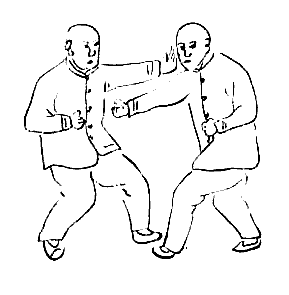 |
||
| 3 | ||
| A immediately counter-attacks with right Bengquan (Crushing Fist) | ||
|
The second one is called practice in three stages. In first stage one should practice softly and slowly; in the middle stage - with vigor and hard (power); in the last stage - in a smooth and balanced way. It is like writing an essay. In first section one writes an outline concentrating on main points and covering whole contents. The (literary) style is slow and soft, broad and rich. In the middle the (subject) is already amplified. Discussed in length and breadth. |
|
Like Changjiang and Huanghe rivers. Rushing down a thousand li. Final section ends preceding text. It is balanced and smooth, mild and roundabout. These are ingenious methods of writers. Why should martial arts practice be different and original? Above two methods are not equally refined. The first one is rough and suitable for beginners. The second one is refined and suitable for long-time (practitioners). And yet, regardless of the method, the movements must be fast and noticeably separated.
Those who practice martial art do it in 80% for themselves and in 20% to use it against others. Hence it is said that strengthening the body gives long-term benefits while defeating the enemy is temporary. (This saying) talks specifically about strengthening the body. Any martial art can be practiced to defeat the enemy and Xingyi specializes in it. The principle of defeating the enemy is to value quality over quantity. (You can) defeat one opponent with this (one) technique, and every opponent can be defeated with this technique. If (you) devote you efforts to practice of multiple (techniques) then they will degenerate. If (you) look for complicated (movements) then (you will only) get confused. If the body is not tempered through correct practice, then (one will) have no technique (that one is) well acquainted with when fighting the enemy. (In this way one will face) two loses. Those who devote their efforts to friendship value the depth of this relation; how broad and not restricted it is; how intensive and not ordinary it is. A lonely pine without branches does not make one as refreshed as flowers and green willows; but it can be said with certainty what will not wither and remain green after cold frosts and severe snows. (That is why) Xingyiquan contains mainly single movements; since this is the correct way of everyday practice.
Only martial arts are regarded profound without limits, broad without boundaries. Those who attained elementary level can defeat one enemy; those who attained the highest level, why can't they defeat ten thousand enemies? First of all (one) should study martial art modestly; however (even if one practices martial art modestly) if (one) stops after gaining a little knowledge, sometime practice, sometimes not, then one cannot expect progress. It is especially difficult with Xingyiquan (practice) where already after a few months (one) thinks (one) has a considerable skill. But (even) after ten years one does not necessarily acquire a consummate skill. Those with superficial knowledge think that perhaps the later is inferior to the former and long-time practice is not as good as temporary one. However with reaching the utmost level of skill (one is) filled with inner strength and the external strength reduces. Only after many years of constant practice one may attain this utmost level. Those who attained it were modest and had perseverance. |
PI QUAN - CHOPPING FIST "Chopping Fist belongs to Metal; its Form is like an Axe and Intention is like Chopping something" |
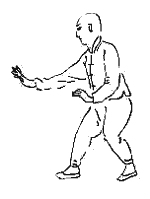 |
||||||
| BENG QUAN - CRUSHING FIST "Crushing fist belongs to Wood; its Form is like an Arrow and Intention is like Shooting something" |
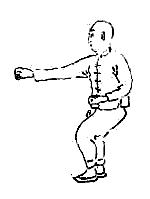 |
|||||||
| ZUAN QUAN - DRILLING FIST "Drilling Fist belongs to Water; its Form is like Lightning and Intention is like a Winding Stream" |
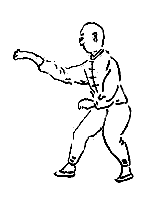 |
|||||||
| PAO QUAN - CANNON FIST "Cannon Fist belongs to Fire; its Form is like Cannon; horizontal power is extremely great, it has the nature of a Gun" |
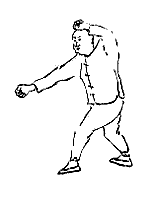 |
|||||||
| HENG QUAN - HORIZONTAL FIST "Horizontal Fist belongs to Earth; its Form is like a Bullet" |
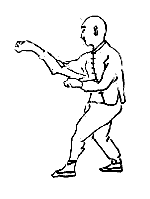 |
|
Many people often say that there are many secrets in martial arts. This is because when (martial artists) are asked they do not answer, and (even if) they answer, they do not say everything. Is it like this? Those (students) who are easily satisfied (with their achievements) either rashly try their skill and bring trouble on themselves or like to fight and bully people; these are ways to self-destruction. Those (students) who do not have perseverance think they know enough when they have just a smattering of knowledge; their morning interest in practice disappears in the evening and they think they have already attained high level of skill. However when they try it without result, they either explain that their teacher cheated them or that what they learnt was wrong. (However in fact) not only they were wrong people to pass (martial art) to but also they disregarded the art for all their lives. Isn't this (true) selfishness?
|
The end of "Excerpts from Five Elements Essentials of Yue's Intention Boxing"; © J.Szymanski 1999-2002 |
Home ▪ About me ▪ Updates ▪ Taiji ▪ Bagua ▪ Xinyi-Xingyi ▪ Other Styles ▪ News ▪ Store ▪ Community ▪ Email